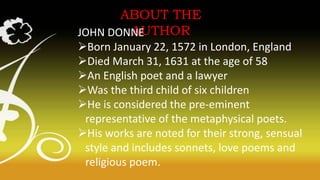Death, Be Not Proud By John Donne
- 1. LEARNING COMPETENCIES • analyze literature as a means of valuing other people and their various circumstances in life. (EN9LT-IIc-15) • explain how the elements specific to a genre contribute to the theme of a particular literary selection. (EN9LT-IIc
- 2. DEATH, BE NOT PROUD By: John Donne
- 3. VOCABULARY BUILDING 1.Mighty – powerful 2.Dreadful – frightful 3.Overthrow – to remove from power specially by force 4.Eternally – everlasting 5.Stroke – beat
- 4. ABOUT THE AUTHORJOHN DONNE Born January 22, 1572 in London, England Died March 31, 1631 at the age of 58 An English poet and a lawyer Was the third child of six children He is considered the pre-eminent representative of the metaphysical poets. His works are noted for their strong, sensual style and includes sonnets, love poems and religious poem.
- 5. BRIEF BACKGROUND OF THE POEM Death,Be Not Proud is also known as Sonnet X (Sonnet 10) It is a fourteen line poem It is written between February and august 1609 It was first published posthumously in 1633
- 6. Death, Be Not Proud Death, be not proud, though some have called thee Mighty and dreadful, for thou art not so; For those whom thou think’st thou dost overthrow Die not, poor Death, nor yet canst thou kill me. From rest and sleep, which thy pictures be, Much pleasure; then from thee much more must flow, And soonest our best men with thee do go, Rest of their bones, and soul’s delivery.
- 7. Thou art slave to fate, chance, kings, and desperate men, And dost with poison, war, and sickness dwell. And poppy of charms can make up sleep as well And better than thy stroke; why swell’st thou then? One short sleep past, we wake eternally And death shall be no more; Death, thou shalt die.
- 8. LINES 1-4 This is essentially the main point of the entire poem. Donne tells Death not to be proud. Some people have called Death powerful, but Donne claims death is not. Death may believe that he has defeated those who die, but Donne states those people do not truly die because their souls in the afterlife. According to Donne and the poem, people who die are only dead momentarily, then they live along with all the spirits in Heaven. This is why Donne claims Death cannot kill him.
- 9. LINES 5-8 In line 5, the word pictures more closely means images. In this way this line is stating that the image of death looks just like a person who is sleeping, which is actually a pleasurable event. Then Donne admits that the best men on the planet must go with Death at some point. However Donne claims this is not a terrible thing at all. Death is merely giving rest to their bones and delivering their souls to the after life.
- 10. LINES 9-12 The speaker kicks it up a notch, calling Death a “slave” and accusing him of hanging out with those lowlifes “poison, war and sickness.”










